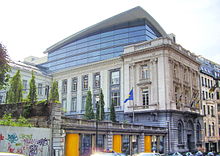Political status
See also: Partition of Belgium § Brussels; and Communities, regions and language areas of Belgium § Brussels
The Brussels-Capital Region is one of the three federated regions of Belgium, alongside Wallonia and the Flemish Region. Geographically and linguistically, it is a bilingual enclave
in the unilingual Flemish Region. Regions are one component of
Belgium's institutions, the three communities being the other component:
Brussels' inhabitants deal with either the French Community or the Flemish Community for matters such as culture and education.Institutions
Main articles: Government of the Brussels-Capital Region and Parliament of the Brussels-Capital Region
The Brussels-Capital Region is governed by a parliament of 89 members
(72 French-speaking, 17 Dutch-speaking, parties are organised on a
linguistic basis) and an eight-member regional cabinet consisting of a
minister-president, four ministers and three state secretaries. By law,
the cabinet must comprise two French-speaking and two Dutch-speaking
ministers, one Dutch-speaking secretary of state and two French-speaking
secretaries of state. The minister-president does not count against the
language quota, but in practice every minister-president has been a
bilingual francophone. The regional parliament can enact ordinances
(French: ordonnances, Dutch: ordonnanties), which have equal status as a national legislative act.19 of the 72 French-speaking members of the Brussels Parliament are also members of the Parliament of the French Community of Belgium, and until 2004 this was also the case for six Dutch-speaking members, who were at the same time members of the Flemish Parliament. Now, people voting for a Flemish party have to vote separately for 6 directly elected members of the Flemish Parliament.
The Brussels Region is the only one that is not subdivided into provinces, nor is it a province itself. Within the Region, 99% of the areas of provincial jurisdiction are assumed by the Brussels regional institutions. Remaining is only the governor of Brussels-Capital and some aides. Its status is roughly akin to that of a federal district.
Agglomeration of Brussels
Before the creation of the Brussels-Capital Region, regional competences in the 19 municipalities were performed by the Brussels Agglomeration. The Brussels Agglomeration was an administrative division that was established in 1971. This decentralised administrative public body also assumed jurisdiction over areas that elsewhere in Belgium were exercised by municipalities or provinces.[37]The Brussels Agglomeration had a separate legislative council, but the by-laws enacted by it did not have the status of a legislative act. The only election of the council took place on 21 November 1971. The working of the council was subject to many difficulties caused by the linguistic and socio-economic tensions between the two communities.
After the creation of the Brussels-Capital Region, the Brussels Agglomeration was never formally abolished, although it no longer has a purpose.

No comments:
Post a Comment